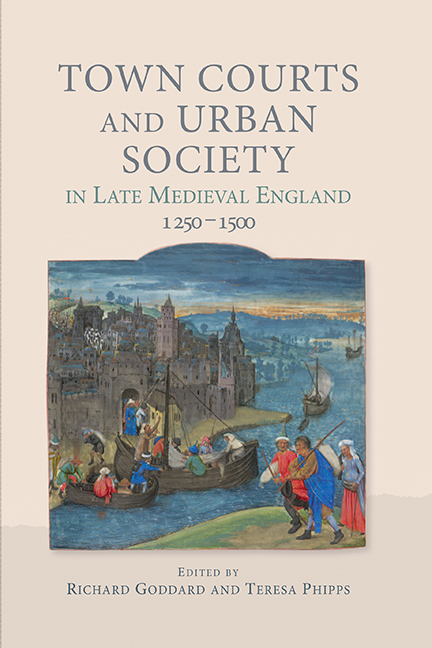Book contents
- Frontmatter
- CONTENTS
- List of Illustrations
- Contributors
- Acknowledgements
- List of Abbreviations
- Introduction
- Jane Laughton: In Memoriam
- 1 Town Courts in Medieval England: An Introduction
- 2 Borough Court Cases as Legal Precedent in English Town Custumals
- 3 The Priest of Nottingham and the Holy Household of Ousegate: Telling Tales in Court
- 4 Female Litigants and the Borough Court: Status and Strategy in the Case of Agnes Halum of Nottingham
- 5 Courts and Urbanisation: Jurisdiction in Late Medieval Seigneurial Boroughs and Towns
- 6 The Business of the Leet Courts in Medieval Norwich, 1288–1391
- 7 The Black Death and the Borough Court: The Changing Pattern of Social and Judicial Representation in Late Medieval Lincoln
- 8 Justice and Jurisdictions in Late Medieval Chester
- 9 Trust: Business Networks and the Borough Court
- 10 Society, Status and the Leet Court in Margery Kempe's Lynn
- Appendix: An Annotated List of Printed or Online Transcriptions and Translations of Medieval Town Courts in Britain to 1500
- Bibliography
- Index
3 - The Priest of Nottingham and the Holy Household of Ousegate: Telling Tales in Court
Published online by Cambridge University Press: 14 September 2019
- Frontmatter
- CONTENTS
- List of Illustrations
- Contributors
- Acknowledgements
- List of Abbreviations
- Introduction
- Jane Laughton: In Memoriam
- 1 Town Courts in Medieval England: An Introduction
- 2 Borough Court Cases as Legal Precedent in English Town Custumals
- 3 The Priest of Nottingham and the Holy Household of Ousegate: Telling Tales in Court
- 4 Female Litigants and the Borough Court: Status and Strategy in the Case of Agnes Halum of Nottingham
- 5 Courts and Urbanisation: Jurisdiction in Late Medieval Seigneurial Boroughs and Towns
- 6 The Business of the Leet Courts in Medieval Norwich, 1288–1391
- 7 The Black Death and the Borough Court: The Changing Pattern of Social and Judicial Representation in Late Medieval Lincoln
- 8 Justice and Jurisdictions in Late Medieval Chester
- 9 Trust: Business Networks and the Borough Court
- 10 Society, Status and the Leet Court in Margery Kempe's Lynn
- Appendix: An Annotated List of Printed or Online Transcriptions and Translations of Medieval Town Courts in Britain to 1500
- Bibliography
- Index
Summary
Court records have conventionally been analysed from the perspective of what they tell us about people's engagement with law, or to generate information about the local economy, social networks and the like. This chapter proposes instead to focus on the fictive nature of court records, including depositions from Church courts, and to explore issues of narrative and narrative structure. The concern is less with what we can learn from the information recorded, such as the nature and value of goods in debt cases or patterns of litigation by status or gender, but rather to ask what the narrative strategies adopted by litigants or by those charged with recording cases tell us about contemporary values and anxieties. Realising and trying to understand this may help us better comprehend the underlying information recorded; it is also of value in its own right as a window into the cultural values and mentalité of civic magistrates or of canon lawyers, and of the bourgeois men and women who were the primary users of the urban courts. The chapter will draw upon a small number of case studies chosen from different kinds of court record and different urban communities, but all from the last years of the fourteenth and early years of the fifteenth century, to make its arguments.
We can think about court records in terms of three distinct stages or historical moments, where the third stage is the use by modern scholars of the extant records. The first stage is represented by the historic event or events that generate the litigation in the first place. So, in a disputed marriage case, for example, a couple exchange loving words signifying that they desire to be married to one another. Or maybe – as the defendant in the subsequent court action will claim – they do not, because the man (it usually is the man) was someone else at the time. What actually happened – history ‘wie es eigentlich gewesen’ (how it really was), as von Ranke famously put it – is fixed, but also always beyond our reach. We can access evidence for that history only in the form of documents that by their nature dispute these past events.
- Type
- Chapter
- Information
- Publisher: Boydell & BrewerPrint publication year: 2019



